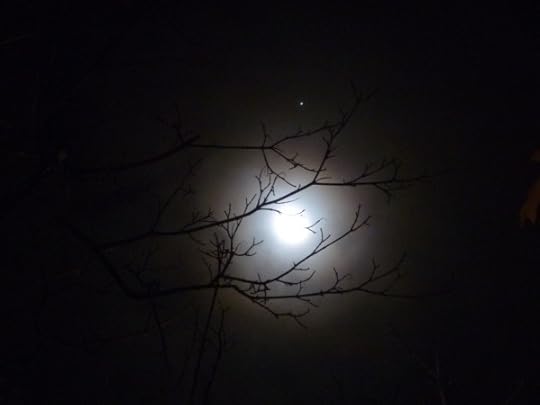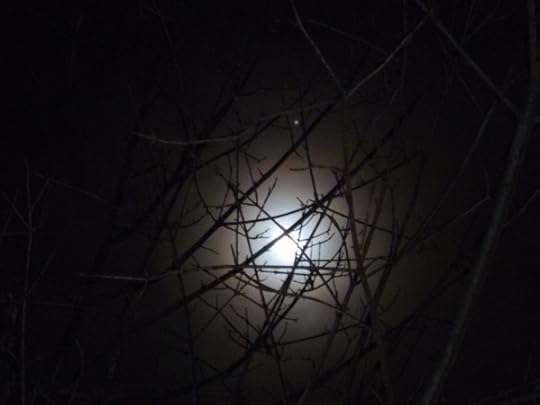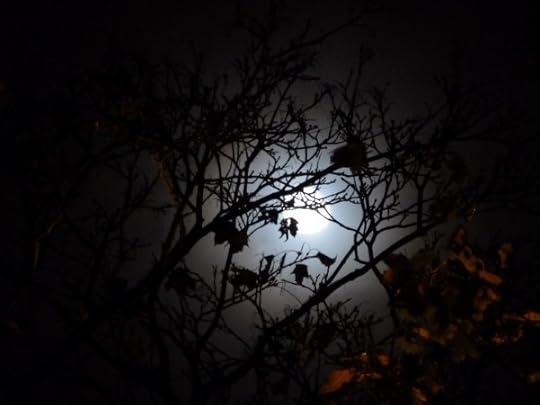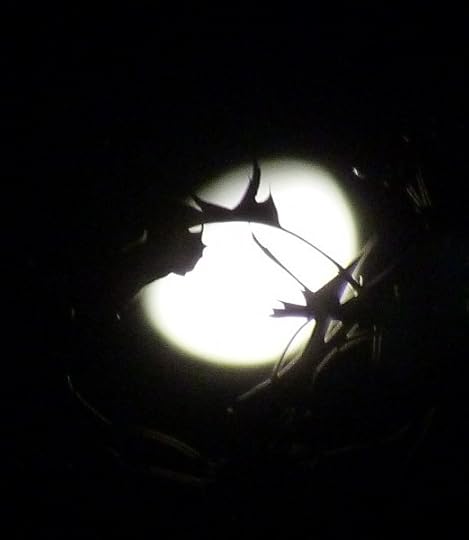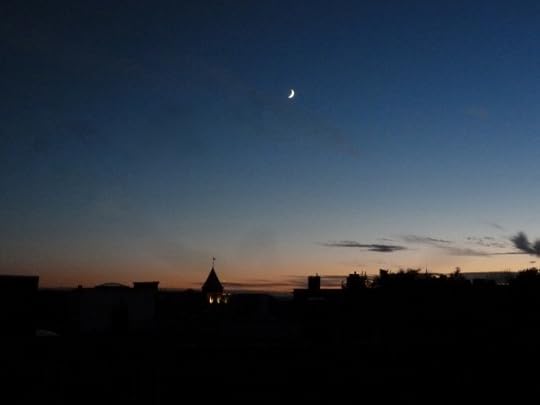Greer Gilman's Blog, page 74
November 13, 2012
Why must the show go on?
Just back from a Delightful Weekend in the Country. It’s been far too long since the CV (Culture Vulture) and I did our Midwinter Movie Madness. This one was pretty low-key—I think our record is 19 films in a three-day weekend, a third of them in actual theatres—but lovely.
Of course, we could have lolled forever in the great tufted Chesterfield suite of BBC classics—and we did revisit Wives & Daughters. We had sterner movies in reserve, dark serious Norwegian and Polish stuff, but somehow we didn’t get around to it this time. I think we were too giddy with the election and wanted pure celebration, and a tinful of Tollhouse cookies. We did have some snark with our borscht for dinner--In the Loop, The Trip.
The heart of the program was four revels* and an elegy.
Revels
Sadly, the first of these was A Waste of Shame: The Mystery of Shakespeare and His Sonnets. Oh dear oh dear. A tissue of twaddle, all about Mr. W.H. and the Dark Lady. You’d think that Will Shakespeare wrote nothing but incessant sonnets, as if they were some kind of anguished tweet. Their William Herbert is a vacuous Goth punk; their Lucie (as Moorish drab), Orientalized softcore. Nothing whatever happens here above the waist. Even Ben Jonson comes off as a humor: Sir Posthumus Cockstand.
And the design is just awful: black ruffs and neon wigs—troll pink and traffic orange—and the Dark Lady got up like Aladdin’s princess in a panto.
In the end (which is 1609) Shakespeare pays an unwilling Thomas Thorpe to print his sonnets, as a spite; then he goes off (in a coach, no less) to Stratford and his shrewish stultifying wife, to die of pox.
Stale, flat, and unprofitable.
The other three pieces were old friends and fabulous.
A Midwinter’s Tale (In the Bleak Midwinter, 1995) is the only thing of Kenneth Branagh’s that I love. He wrote and directed it, but he’s not in it, mugging. A gang of lunatics do Hamlet in a redundant church at Christmas. Michael Maloney and Julia Sawalha are Mickey and Judy. Slight, endearing, and hilarious.
Slings & Arrows (the Hamlet season, 2003). Just bloody brilliant.
Stage Beauty (2004): Restoration comedy. The last man to play Desdemona, Mr. Edward Kynaston, tangles with Mrs. Margaret Hughes, the first woman in that part. Pepys observes. I roll my eyes at the premature invention of naturalistic acting—Othello as Streetcar—but it’s otherwise bliss. I so love the image of Rupert Everett’s Charles II (with terrible grey tufts of wig hair) lying in a sea of spaniels and Nell Gwynn.
Elegy
In honor of Remembrance Day, we watched A Month in the Country (1987), a film of J. L. Carr’s fine and quiet book. The principals are Colin Firth—so young that his mustache is his face—a puppyish Kenneth Branagh, and a luminous, lost Natasha Richardson. It is after the Great War. Two damaged men, strangers, come to the village of Oxengodby to work: Birkin uncovering a mediaeval fresco in the church, a Last Judgment; and Moon digging for bones and secrets. Rain falls. A Chapel organ is considered and bought. Birkin and the vicar’s wife talk about apples. Nothing and everything happens.
Nine
*Films about playing Shakespeare. It was going to be straight Shakespeare, but my Hollow Crown hadn’t arrived. (Still hasn’t, damn it.)
Of course, we could have lolled forever in the great tufted Chesterfield suite of BBC classics—and we did revisit Wives & Daughters. We had sterner movies in reserve, dark serious Norwegian and Polish stuff, but somehow we didn’t get around to it this time. I think we were too giddy with the election and wanted pure celebration, and a tinful of Tollhouse cookies. We did have some snark with our borscht for dinner--In the Loop, The Trip.
The heart of the program was four revels* and an elegy.
Revels
Sadly, the first of these was A Waste of Shame: The Mystery of Shakespeare and His Sonnets. Oh dear oh dear. A tissue of twaddle, all about Mr. W.H. and the Dark Lady. You’d think that Will Shakespeare wrote nothing but incessant sonnets, as if they were some kind of anguished tweet. Their William Herbert is a vacuous Goth punk; their Lucie (as Moorish drab), Orientalized softcore. Nothing whatever happens here above the waist. Even Ben Jonson comes off as a humor: Sir Posthumus Cockstand.
And the design is just awful: black ruffs and neon wigs—troll pink and traffic orange—and the Dark Lady got up like Aladdin’s princess in a panto.
In the end (which is 1609) Shakespeare pays an unwilling Thomas Thorpe to print his sonnets, as a spite; then he goes off (in a coach, no less) to Stratford and his shrewish stultifying wife, to die of pox.
Stale, flat, and unprofitable.
The other three pieces were old friends and fabulous.
A Midwinter’s Tale (In the Bleak Midwinter, 1995) is the only thing of Kenneth Branagh’s that I love. He wrote and directed it, but he’s not in it, mugging. A gang of lunatics do Hamlet in a redundant church at Christmas. Michael Maloney and Julia Sawalha are Mickey and Judy. Slight, endearing, and hilarious.
Slings & Arrows (the Hamlet season, 2003). Just bloody brilliant.
Stage Beauty (2004): Restoration comedy. The last man to play Desdemona, Mr. Edward Kynaston, tangles with Mrs. Margaret Hughes, the first woman in that part. Pepys observes. I roll my eyes at the premature invention of naturalistic acting—Othello as Streetcar—but it’s otherwise bliss. I so love the image of Rupert Everett’s Charles II (with terrible grey tufts of wig hair) lying in a sea of spaniels and Nell Gwynn.
Elegy
In honor of Remembrance Day, we watched A Month in the Country (1987), a film of J. L. Carr’s fine and quiet book. The principals are Colin Firth—so young that his mustache is his face—a puppyish Kenneth Branagh, and a luminous, lost Natasha Richardson. It is after the Great War. Two damaged men, strangers, come to the village of Oxengodby to work: Birkin uncovering a mediaeval fresco in the church, a Last Judgment; and Moon digging for bones and secrets. Rain falls. A Chapel organ is considered and bought. Birkin and the vicar’s wife talk about apples. Nothing and everything happens.
Nine
*Films about playing Shakespeare. It was going to be straight Shakespeare, but my Hollow Crown hadn’t arrived. (Still hasn’t, damn it.)
Published on November 13, 2012 18:18
November 5, 2012
A dark lantern and a burning match
In the gathering of the great October storm, I went to see a twenties Macbeth done by the unevenly brilliant Actors' Shakespeare Project. They began with a silent funeral procession: mourners with umbrellas walking solemnly behind a baby’s coffin. (I have given suck.) Damn. Works for me. And of course the three nuns gliding piously in their great swanlike wimples, “All suddenly mount / And scatter wheeling ... Upon their clamorous wings.” They become the Witches.
Fair is foul. Nice. But I wish then they’d cast off their equivocal holiness. (“Look like the innocent flower / But be the serpent under it.”) They stayed nuns throughout, engaging in Loudun-like antics. It was allegory, when it ought to be uncanny.
I liked the Lady in bronze satin, pulling on her long long evening gloves, their shadows serpentining on the scrim.
Allyn Burrows as Macbeth was hacked steel.
I liked the bespectacled cream-faced loon, who'd clearly wandered from a Wodehouse novel into horror, and kept chittering and inching backward with a nervous placatory smile, groping for some lost doorknob, and the way back into Blandings Castle.
Best doubling: the protean Richard Snee as Duncan/Porter.*
Then I walked home from Medford in the dusk and rising wind, just as the rain began.
It was the perfect atmosphere in which to do the last candlelight-and-shadow touches on my Ben Jonson mystery and send it off.
It’s been a great few weeks for James VI & I.
By good fortune back in May, while visiting with shewhomust
and
shewhomust
and
 durham_rambler
, I caught a part of James Shapiro’s look at Jacobean Shakespeare, The King and the Playwright. Having just found it online, I’ve now watched all three.
durham_rambler
, I caught a part of James Shapiro’s look at Jacobean Shakespeare, The King and the Playwright. Having just found it online, I’ve now watched all three.
This will be Shapiro's next book, and he's thought long and well on that bruised age. (His favorite words seem to be “anxiety” and “regime.”) Of course there was excellent stuff on the Gunpowder Plot, on the trial of Father Henry Garnet and “equivocation” in Macbeth. But also on James’s deprecation of the old Queen’s tomb (he parked her in a corner with Mary: take that! you withered-up and childless queens, you two dead ends), and the exaltation of his mother’s; on Union and enclosure, plague, famine, riot; translation, patronage; harsh winters; alliances, scandals, and the death of an antique Roman prince. And above all (for me) on Blackfriars: how moving to a smaller, indoor playing space evolved how Shakespeare wrote.** Artificial light; a five-act structure, to accommodate the change of candles; offstage fights (one must not run the patrons through or bespatter the toffs with bladders full of pigs’ blood); soft music (we got a lutenist and Ariel); masquing. Spectacle. No tongue. All eyes! says Prospero. Metamorphoses were offstage at the Globe. Now Hermione is to be seen.
It’s always the small things that catch at me.
When Shakespeare was lodging on Silver Street with that family of tiremakers—as Charles Nicholl observes—he wrote images of wire and silk: “the ravell'd sleave of care.”
And now we’re shown a scholar-artist making up a still Hermione. She holds an oyster shell with powdered pearl in it; she brushes transformation on the lady’s cheek and brow. She is winding up the magic, stilling time: when it wakes, the statue will descend and speak.
Nine
*Legendary adlib at an RSC performance of Macbeth:
"...the Porter, swaggering about the stage and ogling the audience, asked in a leering voice, 'Knock, knock! Who's there? [pause] Duncan? [another pause] Dunk and disorderly.'"
**Did you know the Globe people were building a Blackfriars? I didn’t. Woot!
9
Fair is foul. Nice. But I wish then they’d cast off their equivocal holiness. (“Look like the innocent flower / But be the serpent under it.”) They stayed nuns throughout, engaging in Loudun-like antics. It was allegory, when it ought to be uncanny.
I liked the Lady in bronze satin, pulling on her long long evening gloves, their shadows serpentining on the scrim.
Allyn Burrows as Macbeth was hacked steel.
I liked the bespectacled cream-faced loon, who'd clearly wandered from a Wodehouse novel into horror, and kept chittering and inching backward with a nervous placatory smile, groping for some lost doorknob, and the way back into Blandings Castle.
Best doubling: the protean Richard Snee as Duncan/Porter.*
Then I walked home from Medford in the dusk and rising wind, just as the rain began.
It was the perfect atmosphere in which to do the last candlelight-and-shadow touches on my Ben Jonson mystery and send it off.
It’s been a great few weeks for James VI & I.
By good fortune back in May, while visiting with
 shewhomust
and
shewhomust
and
 durham_rambler
, I caught a part of James Shapiro’s look at Jacobean Shakespeare, The King and the Playwright. Having just found it online, I’ve now watched all three.
durham_rambler
, I caught a part of James Shapiro’s look at Jacobean Shakespeare, The King and the Playwright. Having just found it online, I’ve now watched all three.This will be Shapiro's next book, and he's thought long and well on that bruised age. (His favorite words seem to be “anxiety” and “regime.”) Of course there was excellent stuff on the Gunpowder Plot, on the trial of Father Henry Garnet and “equivocation” in Macbeth. But also on James’s deprecation of the old Queen’s tomb (he parked her in a corner with Mary: take that! you withered-up and childless queens, you two dead ends), and the exaltation of his mother’s; on Union and enclosure, plague, famine, riot; translation, patronage; harsh winters; alliances, scandals, and the death of an antique Roman prince. And above all (for me) on Blackfriars: how moving to a smaller, indoor playing space evolved how Shakespeare wrote.** Artificial light; a five-act structure, to accommodate the change of candles; offstage fights (one must not run the patrons through or bespatter the toffs with bladders full of pigs’ blood); soft music (we got a lutenist and Ariel); masquing. Spectacle. No tongue. All eyes! says Prospero. Metamorphoses were offstage at the Globe. Now Hermione is to be seen.
It’s always the small things that catch at me.
When Shakespeare was lodging on Silver Street with that family of tiremakers—as Charles Nicholl observes—he wrote images of wire and silk: “the ravell'd sleave of care.”
And now we’re shown a scholar-artist making up a still Hermione. She holds an oyster shell with powdered pearl in it; she brushes transformation on the lady’s cheek and brow. She is winding up the magic, stilling time: when it wakes, the statue will descend and speak.
Nine
*Legendary adlib at an RSC performance of Macbeth:
"...the Porter, swaggering about the stage and ogling the audience, asked in a leering voice, 'Knock, knock! Who's there? [pause] Duncan? [another pause] Dunk and disorderly.'"
**Did you know the Globe people were building a Blackfriars? I didn’t. Woot!
9
Published on November 05, 2012 18:22
November 3, 2012
Hedgehog trapped in crisp packet in Weston-super-Mare!
Published on November 03, 2012 16:28
November 1, 2012
Hunting the moon
Published on November 01, 2012 23:01
An apple, a pear, a plum, or a cherry...
Published on November 01, 2012 20:12
October 29, 2012
A thousand furlongs of sea
About the time this afternoon I realized Wait, no cookies in the house the big blow started and a guy came staggering through our building's front door looking as if he'd drowned off Cape Hatteras.
Spent a peaceful afternoon and evening with mugs of tea, tweaking my Jacobean story to hand in.
Hope you're all snug and dry.
Nine
Spent a peaceful afternoon and evening with mugs of tea, tweaking my Jacobean story to hand in.
Hope you're all snug and dry.
Nine
Published on October 29, 2012 22:37
October 24, 2012
moon egg
Published on October 24, 2012 22:40
October 18, 2012
new moon
Published on October 18, 2012 19:42
October 1, 2012
Altarwise
I made a deity this week. I put a windfall from a storm, a branch of oak leaves, in a wooden eggcup on the altar where I keep my talismans. And then I found a much beloved, elusive scarf pin of a face—a numen or a nymph. It's mischievous—it slips away, will not be pinned. And I'd been finding it and losing it all week in the upheaval, until the last time when I pounced on it, and thought, I'll put you here, where I can see you. And I stuck it in upright in the leaves.
When I turned round again, the three—the cup, the branch, the trinket—had become an ever-changing one, a swift-still metamorphosis.
At times they're an autumnal Ariel....

...or else a dryad by Vermeer....

...a punk Annunciation by a stubbled Gabriel...

...a just-pubescent Merlin, ancient to the edge of childhood...

...and in certain shadows now, a harpy in a wood of souls.
Nine
When I turned round again, the three—the cup, the branch, the trinket—had become an ever-changing one, a swift-still metamorphosis.
At times they're an autumnal Ariel....

...or else a dryad by Vermeer....

...a punk Annunciation by a stubbled Gabriel...

...a just-pubescent Merlin, ancient to the edge of childhood...

...and in certain shadows now, a harpy in a wood of souls.
Nine
Published on October 01, 2012 00:33
September 30, 2012
Harvest Moon
Published on September 30, 2012 17:48
Greer Gilman's Blog
- Greer Gilman's profile
- 42 followers
Greer Gilman isn't a Goodreads Author
(yet),
but they
do have a blog,
so here are some recent posts imported from
their feed.


